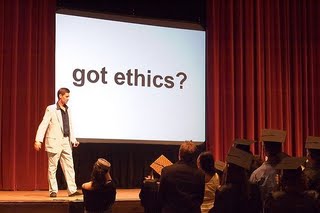 J’accuse.
J’accuse.
In looking at FindLaw’s new gaggle of so-called “blogs” that are little more than crappy search engine fodder and client solicitations, I struggled to find the right word to describe them. The ramifications of these crap-blogs are important, because FindLaw is now tainting their clients, diminishing the stature of their vaunted professor-commentators, and lowering the level of discourse in the legal profession as a whole. And because this is likely to be a source of discussion going forward, it also means these so-called “blogs” need an appropriate name.
Just as the two-week holiday started, I noted that FindLaw ripped-off the name of my blog, recently creating their own New York Personal Injury Law Blog. (Link coded as “nofollow” to avoid giving Google juice). But the problem, as noted by others, isn’t just that they ripped off my name, but that they did so with unadulterated dreck. That was one of many new, similar sites that they created.
To be clear, dreck-bloggers aren’t interested in creating good content, they simply regurgitate local accident or arrest stories and place a call-to-action link at the bottom. Posts are filled with buzzwords to game Google that, if coupled with the call-to-action for a recent event, places them firmly in the camp of Solicitation 2.0, a subject I dealt with two years ago. Put bluntly, many of these dung-blogs are electronically soliciting clients. E-chasing, for lack of a better word.
In this posting, for example, FindLaw re-writes the story of a local accident that killed four and injured two, and in just the third sentence its author spits out:
If speed was the factor that caused this collision, then the families of the victims (and the surviving victims themselves) could hire a New York injury attorney to sue the person responsible.
The author made sure to name each of the deceased, provided two separate links back to the list of lawyers that pay FindLaw, and included a call-to-action. (If you have suffered a personal injury…blah, blah, blah.) There is, of course, no natural audience for such a “blog.” The postings do not allow for comments, nor is there any attempt at creativity or analysis.
An example of how FindLaw prostitutes itself to the alter of Google — FindLaw’s prior reputation and quality writing in its Writ commentary be damned — is in the “about” section. They place 97 words in two sentences of which a remarkable 37 are keywords, to come up with this contorted piece of SEO “writing”:
The New York Personal Injury Law Blog covers news and developments in the area of personal injury and tort law in New York state, and New York City specifically, and helps to connect people with New York injury lawyers. The New York Personal Injury Law Blog is intended to serve as a resource for people working through a personal injury issue in New York, or those who are interested in New York personal injury and tort law generally, including New York personal injury attorneys who wish to keep up with the latest news developments.
[Note: I wrote about the problem of keyword clutter previously in I Hate My Website.]
As Scott Greenfield puts it at FindLaw Plays Dirty (where he warns others of FindLaw stealing their well-known blog names):
These aren’t blogs, of course, in the sense that we understand them. There are mere names designed to trade in on search engine keywords, and capitalize on Findlaw’s SEO ability to get their scam blogs higher than yours on the search engine’s first page.
And as Sheryl Sisk puts it in Findlaw vs. NY Personal Injury Law Blog: The Opening Salvo:
Let’s be clear. This isn’t a case of innocently or mistakenly adopting a geocentric keyword-rich blog name. Findlaw’s not staffed by idiots. They knew what they were doing.
What are the consequences of FindLaw‘s folly in creating such sites? 1) it demeans the lawyers that paid them for listings, who are now associated with the scat-blog; 2) it diminishes the work of the professor-commentators at Writ that they currently use; and 3) it brings down the legal profession as a whole by legitimizing such conduct. Let’s take these one at a time:
First, it demeans the people that hired this once-prominent company to market for them. Marc Randazza, on seeing Findlaw’s mierda-blogs, wrote in Findlaw, are you really that douchetastic?:
They hired a milquetoast writer to author a milquetoast blawg for the sole purpose of selling ad space to sh*tty lawyers who can’t develop a reputation on their own.
Ouch. Now I happen to personally know some of those lawyers on the FindLaw list, and know that they are fine lawyers. I’m sure they had no idea that FindLaw would associate garbage with their names when they hired the company as their agents.
But you know what? Others don’t know that. And by creating a turd-blog and associating it with those lawyers, potential clients will come to the exact same conclusion as Randazza. And they will believe that those otherwise reputable lawyers agreed to be part of this ugliness.
And Randazza has more (he always does):
Here’s a rule of thumb… if a blog post ends with “for more information, contact the lawyers at Douchestein and Dickwadbaum,” then it is an advertisement, but, it isn’t advertising the lawyer’s services. It is advertising that lawyer’s stupidity, desperateness, and cluelessness. I would advise any potential client who sees a “blog” that ends its posts that way to turn around, run away, fast as you can, and do not look over your shoulder.
To the lawyers that paid money to FindLaw: You’ve just been sucker-punched. You outsourced your marketing to FindLaw and this is what they created for people to find you. Worse still, some of FindLaw‘s posts may qualify as electronic ambulance chasing. We’re talking serious ethical issues here with e-chasing, and I wonder who the lucky lawyer will be that becomes the test case. When you outsource your marketing you outsource your ethics.
Second in line to get clobbered are the professor-commentators on its roster, such as Anthony Sebok, Marci Hamilton, Michael Dorf, Carl Tobias, Sherry Colb, Joanna Grossman, Neil Buchanan, and Julie Hilden, to name a few.
All of their work on FindLaw‘s Writ has now been instantly devalued and diminished by being associated with the BS-blogs that FindLaw created. Once upon a time it was a feather in the cap to be published by West’s FindLaw. Not any more. Do they care?
The professor-commentators now stand side-by-side with Emily Grube — the author who appears at several of the sites despite the fact they vary both by practice area and jurisdiction– whose bio says she is a “writing specialist” with “experience correcting papers created by freshmen to graduate students.”
Perhaps it’s understandable that FindLaw couldn’t hire more lawyers to write about the law, given this tight job market with firms now at capacity, actively recruiting and unemployed attorneys so difficult to find. It’s not required that a law blogger be a lawyer of course, as Walter Olson of Overlawyered and Point of Law demonstrates, but it just makes it a lot easier to recognize and discuss relevant legal issues.
It’s worth noting that many others stood up and took notice of FindLaw’s ugly conduct — during a holiday week, no less — including: FloridaLegal, Molly McDonough (ABAJournal), BlawgWhisperer (ABAJournal), Ron Coleman, Kevin O’Keefe, Nicole Black, Don Cruse; Lawrence Koplow; Tim Hughes; Copeland Casati; Ryan Daniels; Lydia Bednerik; Kevin Underhill; Gerry Oginiski; A Reasonable Suspicion; and Roy Mura. Some of those folks, also happen to have prominent blogs that FindLaw might rip-off next.
Lastly, and perhaps most importantly for the legal profession as a whole, FindLaw may have taken a smallish problem with a haphazard smattering of phony “blogs” that have popped up over the years, and given them (and newcomers) cover to act in the same unprofessional manner. Instead of raising the bar of discourse for lawyers they have lowered it. For if one of the pre-eminent names in the legal field thinks it’s OK to create a farkakte-blog (and you may have to hit that link unless you know a smattering of Yiddish), what message does that send to other lawyers? To the public? Is FindLaw now so desperate for business, so fearful of Martindale-Hubbell, Avvo and Google Scholar, that they are willing to race down to the muck and tarnish us all?
Greenfield wrote that:
For those of you who have placed their reputation in Findlaw’s hands, be prepared to be tainted by the company you keep.
But I think it is actually worse than that. While such dirt-blogs were previously confined to desperate lawyers here and there, FindLaw now opens the floodgates sewergates for lawyers to create slime for the web, for if it’s good enough for the once-vaunted Thomson West, it’s good enough for them.
Now if I could only find a good word to describe FindLaw’s number-two-blogs and their ilk. I know there’s a good one out there someplace. When others find that word, I’m sure it will hit the fan.





